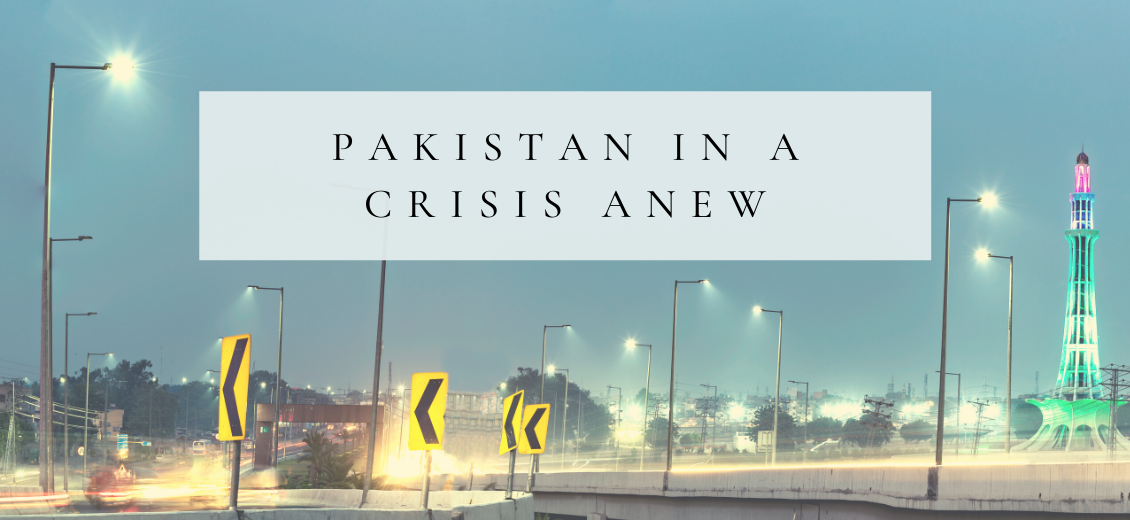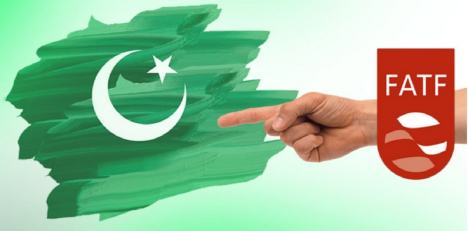Pakistan in a Crisis Anew
Blogs Home
- 10 Jan 2022

Pakistan is in a grave crisis caused by the incumbent government. But what exactly is the issue? Well, some of the major problems the country is currently facing are the rising levels of inflation and the government’s inability to deal with it, the chaos caused by the withdrawal of US troops from Afghanistan, retainment of Pakistan in the Greylist of the Financial Action Task Force (FATF), and the skirmish between Prime Minister Imran Khan and the Pakistani Army. It is to be noted that the next general elections in Pakistan are 2 years away from now and the Prime Minister is looking towards winning another term.
Source: VIF India
Rising inflation levels
On November 23 2021, the Central Bank of Pakistan announced that the country shall witness a 5% growth by the end of the fiscal year in June 2022. On the other hand, many reports suggest that the country is undergoing a deep economic crisis. A study by the Intelligence Unit of The Economist, after Pakistan’s Bureau of Statistics reported a 9.2% increase in inflation in a year since October 2020, concluded that the country shall face this economic crisis for another 6 months. The rupee has been depreciating at a high rate and the inflation rate in Pakistan is the fourth highest in the world (it stood at 12.66 percent, as of October 2021). Due to this issue, many political parties, as well as the general public, have been exerting pressure on Prime Minister Imran Khan. There have been a lot of protests since mid-October and they seem to last longer.
Though the country has received a nod for a financial package of $6 billion worth of funding from the International Monetary Fund (IMF), it was stalled earlier this year due to issues surrounding a few reforms that the IMF had wanted Pakistan to bring about. On November 21, Pakistan finally agreed to execute the reforms, amidst the gruelling crisis. This does bring a sigh of relief to the country, but how long can it sustain itself depending on external sources? Fuel prices have been on the surge and so have been the prices of other essential commodities. Its foreign exchange reserves have been sliding and the current account deficit has been widening. The circumstances don’t seem favourable for Pakistan at the moment.
Saudis comes to Pakistan’s rescue
Pakistan took a loan of $3 billion in late November from Saudi Arabia at a rate of 4 percent interest for a year. This is even higher than the interest rates that China imposes. This loan from Saudi comes with a lot of restrictions and it can potentially take away Pakistan’s financial sovereignty. The clauses say that Pakistan has to pay back the debt in just 48 hours in case it defaults. The definition of default has a very wide scope, as has been mentioned by the Saudis, and can immensely hurt the Pakistani economy.
The default clause can be used by the Saudis if Pakistan fails to abide by any international agreements relating to trade and also if the country fails to increase its taxes on fuel prices, which is already soaring. Pakistan has surely been rescued from any immediate economic crisis since it has reserves enough, as of now, but it has almost lost its financial sovereignty since Saudi Arabia can impose any restrictions on the country now. Also, Saudi Arabia now has the potential to influence Pakistan diplomatically and force it to take up measures to combat terrorism.
FATF greylisting of Turkey and retainment of Pakistan in the list
While the USA and Turkey have been allies for decades, they have been witnessing the nadir of their relations lately. While Pakistan has been retained on the grey list of the Financial Action Task Force (FATF), the global terror financing watchdog, Turkey is a new entrant on the list. This is obviously due to the weakening of the latter’s ties with the USA as well as its ineffectiveness in tackling money laundering and counter-terrorism cases.
The retainment of Pakistan in this list has severe consequences for the country since it shall not be provided aid from external sources. Even if provided, there shall be many reforms sought from the country. There will be greater surveillance of activities being carried out on Pakistani soil. Though there shall be no legal consequences for being retained in the list, Pakistan shall be facing backlash from the international community for not taking adequate steps to combat terrorism.
Isn’t China helping Pakistan?
We have all heard that China and Pakistan are allies. But why isn’t China coming to the rescue of Pakistan? Well, China isn’t willing to rescue any country unless it has any benefits for itself. It is involved in quite a few projects in Pakistan, including the China Pakistan Economic Corridor (CPEC) and the One Belt One Road (OBOR) initiatives. But as has been the case with Sri Lanka and many other countries, China’s modus operandi is the famous, or rather infamous, debt-trap diplomacy.
Under the debt-trap diplomacy, China finances non-viable projects in different countries (in the form of loans) and the receiving country eventually gives up its sovereignty to China. The rates of interest that China charges on these loans are very high and Pakistan cannot afford to take them from China. It is also surprising how Pakistan resorted to taking a rather higher interest loan from Saudi Arabia instead.
The Afghan-factor
While many countries have applauded the help Pakistan had extended to various countries by evacuating their citizens from Afghanistan in August last year, very few have forgotten the fact that Pakistan itself sponsored the growth of terrorism on Afghan soil. Besides this, Afghanistan is now ruled by the Taliban who are extremely unpredictable. Pakistan has its Embassy and other diplomatic channels open in Afghanistan, and there has been no air of hostility between the two countries as of now. But there could be any adverse consequences due to the terror activities carried out by the Taliban inside Pakistan.
It is also of significant importance to talk about the US-Pakistan relations post the withdrawal of US troops from Afghanistan. The 2-decade long friendship between the US and Pakistan has been majorly shaped by the former’s interest in Afghanistan. With the fall of the civilian government in Afghanistan and the rise of the Taliban, the US certainly does not need to endure its friendship with Pakistan. Prime Minister Imran Khan, in his speech at the United Nations General Assembly after the Taliban’s capture of power, said that there is a chance that the instability in Afghanistan spills over into Pakistan and called the global community to recognize the Taliban regime and help it gain stability. PM Khan said so, despite the stringent Taliban regime subjecting female citizens to inequality and suppressing any kind of dissent.
The tussle between the Prime Minister and the army
There has been a cold war between Prime Minister Imran Khan and the Army Chief, General Qamar Javed Bajwa, which ended in October this year. The issue was surrounding the appointment of the new chief of the ISI, the Pakistani intelligence agency. General Bajwa wanted to replace Lt General Faiz Hamid with Lt General Nadeem Anjum as the Chief of the ISI. But since PM Khan had a good rapport with Lt General Hamid, he declined to approve of the appointment of Lt General Anjum. General Bajwa did send in a couple of names for the position so that they could be interviewed by PM Khan, but the former was clear that he would not have anyone except for Lt General Anjum.
PM Khan, after Pakistan beat India in a T20 match in Dubai, rejoiced the victory publicly and made comments that could further worsen the country’s relationship with India. It is widely seen as the PM’s attempt to assert his supremacy over the army since General Bajwa refrains from making any controversial statements in public.
Coming to why PM Khan was reluctant to change the ISI Chief, it is due to the support that he requires from the ISI Chief to win the next elections, due in 2023. PM Khan wanted someone who would favour him. But later in the month, PM Khan had to give in and appoint Lt General Anjum as the Chief of the ISI.
The need to rethink counter-terrorism measures
Pakistan has received backlash from the global community for its inefficiency in combatting terrorism. It needs to mend its ways in order to have other countries aid it in times of distress. Pakistan now has very few allies, out of which Turkey is itself not in a position to help Pakistan, and China never gives grants but only loans. For Pakistan’s economy to stabilize, it has only one option - that is, the implementation of stringent measures to fight terrorism in the region. It is only then that the global community would be willing to help Pakistan overcome its economic crisis.

Uma Sathwika Manda





